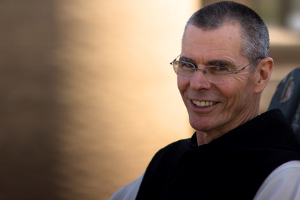Solemnity of Saints Robert, Alberic, and Stephen

"Those who leave all to follow Christ." That is how the Collect for today's liturgy presents our founders. There is the unsavory theme of renunciation
in our celebration today. The Founders of Cîteaux were renunciates,
a word, by the way, that Microsoft Word spell check does not recognize.
Cassian famously in his third Conference picked up on the story of Abram's call in our first reading and through it established the classic theme of renunciation for all Christian monasticism to follow.
-
Leave your country, that is, your resources.
Leave your kinfolk, that is, your judgments, assumptions, and expectations.
Leave your father's house, that is, every vestige of this world your eyes gaze upon.
And certainly when a man enters a monastery, and especially if he perseveres there, this is what he does, or it is what is done to him. He becomes a renunciate. He loses his autonomy, he loses the ground of his identity, and he loses anything that might relieve this loss of his sense of who he is.
Our Founders are right in line with Cassian and the long tradition coming from him, but drew it out even farther so that their renunciation was the renouncing of renunciation itself, the Cistercian contribution to the tradition,
the letting go of the best and highest ideals in favor of the reality of flesh and blood, one's own and those of one's brothers. Here we are, my brothers, sons of our holy founders in our own precious Cîteaux, renunciates of a very imperfect kind.
"Was this longing for the cloister, this joy on finding ourselves in it,
merely the result of childish fancy? Were we deluded by appearances? Did we rejoice without a reason and offer thanks without a sufficient motive?
God forbid that such thoughts should be ever ours.
…
But having found a home and having determined and promised that here should be our life, long or short, what must we do that we may attain the end proposed?"
The questions and the eloquence are both Dom Bruno Ryan's. I recently came upon some notebooks with handwritten sermons of this abbot of New Melleray in the early part of the 20th century. One of the sermons was for the very feast we are celebrating today. If I understand some of the notations correctly, it seems Dom Bruno delivered the same sermon more than once. The one for the founders, for instance, was first delivered at Mount Melleray in 1904 and ten times at New Melleray between 1915 and 1940. Now there's an idea.
"We should study and follow the Fathers of Cîteaux," he said. "Their lives should be our guide, their aims should be also ours, their penances should be as far as possible familiar to us in practice." For Dom Bruno, too, the Founders were renunciates: Asking why Robert left Molesme he answers, "Sweeter to him will be the gibes and sneers of a mocking world, sweeter will be the marshy Cîteaux and solitude with all its terrors, sweeter and more agreeable will be a hut in the midst of a forest than to live in a monastery whose inmates have become too wealthy …, too wise …, to proud …, too great to follow the lines and the letter of the Holy rule of Saint Benedict."
"But what is the Rule?" he asks. "To the religious who has lost fervor it is a heavy yoke, yea a torture, and its very mention pleases him not. To the fervent it is all, its least point is something of inestimable value and to him its violation would be more painful than would be the observance of the most strict point to the tepid." Ah, the Irish!
"For [the Holy Rule]" Dom Bruno continues, "[our Fathers] were ready to part with all … and to bear in their bodies if necessary the marks of their wounded savior." "What the fair moon is to the benighted traveler, what the polar star is to the sailor, what a trusty and sure guide is to the wanderer, that the lives of our saintly founders should be to us. … If we look up to them as our guide a models and rivet our attention and fashion our lives on theirs, they will be what the lighthouse is to the tempest-tossed or rather they will prove themselves to be to us what the harbour is to the wearied voyager, home to the exile, and true consolation to the afflicted."
So that's the eleventh. Another iteration in this our own Cîteaux of this venerable abbot's words 101 years from the first and 66 from the tenth.
"Let us, then, my brothers," he concludes, do willingly the little that we can to be faithful to our holy state, to keep with our brethren and be separated from them … only as little as possible … [walking] as closely as we can the lines traced by the Fathers of Cîteaux."
